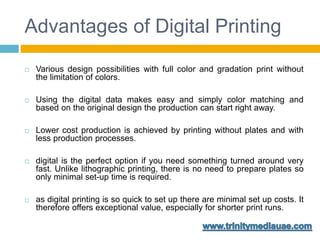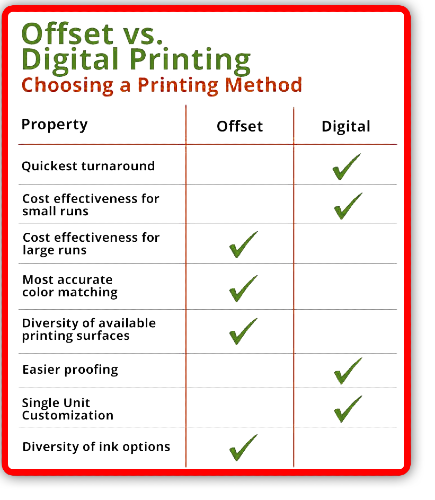The 2-Minute Rule for Digital Printing
The 2-Minute Rule for Digital Printing
Blog Article
See This Report about Digital Printing
Table of ContentsThe Of Digital PrintingNot known Factual Statements About Digital Printing More About Digital Printing10 Easy Facts About Digital Printing ShownThe Greatest Guide To Digital PrintingFascination About Digital Printing
Variable data printing, such as direct mail with customized codes and addresses, is ideally fit for electronic printing. Digital fast printing only requires 4 actions of style, review, printing and binding to get everything done. Digital quick printing has an unrivaled advantage: print on demand.According to PMMI, digital printing enables brands and producers to respond quickly to customer demands while enhancing the supply chain, minimizing warehousing price and waste, and appreciating faster time to market. That all sounds wonderful, yet how does this innovation do all that? The major differentiator of these innovations is that there are no set up costs and no plates with electronic printing.
The smart Trick of Digital Printing That Nobody is Discussing
According to Wikipedia, the greatest distinction between digital printing and typical approaches such as lithography, flexography, gravure, or letterpress - Digital Printing is that there is no need to change printing plates in electronic printing, whereas in these analog printing techniques home plates are continuously replaced. This leads to quicker turn-around time and lowers expense when making use of electronic printing.
Digital printing is very flexible, so it's simple to make adjustments to the package style quickly. It all goes back to the plates.
Much more supply can indicate even more waste in the future. With traditional printing techniques, short-run printing is just not possible. Because a wonderful style can make or break your item, digital printing continually produces premium, clear and colorful graphics each time. Digital printing on flexible bags includes the intense, vibrant, and exact graphics that virtually beckon consumers to connect and touch them.
Digital printing is the procedure of printing digital-based images directly onto a selection of media substratums. There is no need for a printing plate, unlike with balanced out printing. Digital documents such as PDFs or desktop posting data can be sent out straight to the digital printing machine to publish theoretically, picture paper, canvas, textile, synthetics, cardstock and other substratums.
Digital Printing - Questions
According to PMMI, electronic printing allows brand names and suppliers to react rapidly to client demands while improving the supply chain, minimizing warehousing price and waste, and taking pleasure in faster time to market. That all noises wonderful, yet exactly how does this innovation do all that? The major differentiator of these innovations is that there are no set-up costs and no plates with electronic printing.
This results in quicker turn-around time and lowers price when using digital printing.

All about Digital Printing
With traditional printing techniques, short-run printing is simply not feasible. Because a terrific style can make or break see here now your item, electronic printing regularly creates premium, clear and vibrant graphics each time.

According to PMMI, digital printing permits brands and makers to react promptly to customer demands while enhancing the supply chain, decreasing warehousing price and waste, and appreciating faster time to market. That all sounds excellent, but just how does this innovation do all that? The significant differentiator of these technologies is that there are no set-up costs and no plates with electronic printing.
How Digital Printing can Save You Time, Stress, and Money.
This results in quicker turn-around time and decreases expense when utilizing digital printing.
Digital printing is very flexible, so it's simple to make changes to the bundle design swiftly. It all goes back to the plates.

How Digital Printing can Save You Time, Stress, and Money.
Digital printing is the procedure of printing digital-based pictures straight onto a selection of media substrates. There is no requirement for a printing plate, unlike with countered printing. Digital files such as PDFs or desktop computer posting documents can be sent out straight to the electronic printing machine to print on paper, image paper, canvas, textile, synthetics, cardstock and other substratums.
Report this page